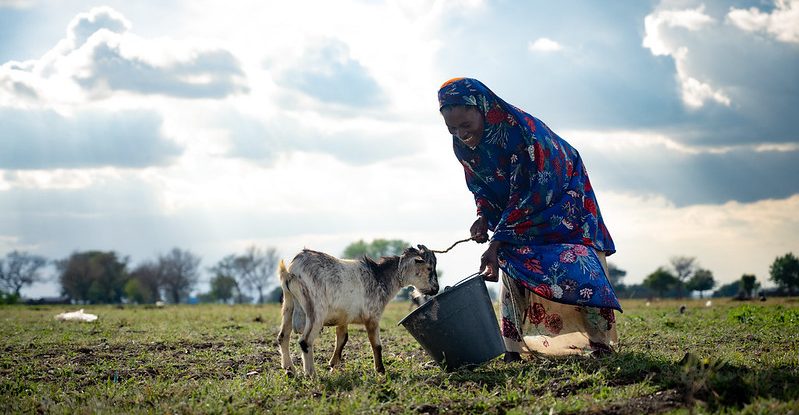As we celebrate International Women’s Day 2024, we are reminded of how far we have come, almost 55 years after Ester Boserup’s influential text examining women and the process of socio-economic development. However, we still have much farther to go.
The glaring issue of gender inequity – which is reflected in this year’s theme of ‘Invest in women: Accelerate progress’ – is especially evident in the Global South and undermines progress towards not just one, but all of the United Nations’ Sustainable Development Goals for the rest of this decade.
One of the key challenges in achieving gender equity by 2030 is a lack of financing, reflected by an annual deficit of USD 360 billion in spending on gender-equity measures, according to UN Women.
Currently, women’s organizations receive just 0.13 percent of total official development assistance to address gender-related poverty and inequity.
The bottom line is that we need more investment in development work, and the focus of that investment should be on gender and social equity. At the same time, we see many examples that ‘business as usual’ isn’t working and that gender biases – both of project implementors and of local communities – influence the outcome of a project. Investing in women and locally led approaches is the way forward.
The Center for International Forestry Research and World Agroforestry (CIFOR-ICRAF) provides important lessons and insights on how investing in women-led and gender-focused activities supports the inclusive management and governance of forests, land, and other natural resources while contributing to gender equity and strengthening women’s empowerment.
Advancing gender equity on the ground requires adaptive and locally led approaches to co-design tools and actions that respond to the priorities and lived experiences of the communities with whom CIFOR-ICRAF works.
We understand gender transformative approaches (GTAs) as activities that aim to go beyond the symptoms of gender inequality to address underlying and structural causes of gender inequalities – formal and informal – and to challenge power relations and structural barriers at and across multiple levels. They are activities that are locally led through collective action and leadership, are adaptive and responsive to local needs and priorities, recognize the multiple and intersecting forms of discrimination, and should facilitate trust, ownership, visioning, and critical reflection.
The Women’s Resource Rights Initiative is a project that has utilized these tools successfully. Collaborating with Alliance Biodiversity International – CIAT and the International Food Policy Research Institute (IFPRI), CIFOR-ICRAF has worked in Bangladesh, Colombia, Ethiopia, The Gambia, Kyrgyzstan, and Uganda to identify opportunities to integrate gender-transformative approaches.
The three-year initiative, which is supported by the International Fund for Agricultural Development (IFAD), co-designs and deploys GTAs that promote the recognition and protection of women’s land and resource rights by engaging key stakeholders, building capacities, and informing policy.
This project co-created tools and adapted tools depending on project phase and context to address the underlying causes of insecure women’s land and resource tenure. Examples included legal and human rights training, community dialogue facilitation tools for project implementers, masculinities training, financial literacy programmes, and visioning for the future.
Another project that uses GTAs to achieve strategic development objectives is funded by UK PACT, a United Kingdom government initiative, and aims to tackle widespread land degradation in Kenya.
The project addresses land degradation, climate change, biodiversity loss and poverty through nature-based solutions, including planting the right trees in the right place for the right purpose, farmer-managed natural regeneration (FMNR), soil and water conservation, agroecology, and other restoration practices, while strengthening environmental monitoring frameworks in Kenya.
It addresses gender not only as a consideration throughout all activities, but also directly and separately.
The project includes two-day workshops held with men and women from government, non-governmental organizations, and various community-based and farmers’ groups. These workshops raise awareness of the importance of gender and social inclusion in land restoration and strengthen people’s capacity to facilitate conversations around gender, equity, and transformation.
Yet there are still significant barriers to gender equity.
The most common one is the need for resources and investment prioritization. While donors are increasingly including project requirements to explicitly address gender, these actions are not enforced or technically reviewed, and projects may not make full use of gender expertise to design and implement these actions.
Furthermore, ensuring equitable representation and distribution of benefits means addressing the underlying social norms that determine gender-based roles, responsibilities, and values. It means breaking down existing structural barriers to increase women’s participation by providing childcare and food to ease the physical labour and mental load that women experience by taking on additional work while working towards a redistribution of ‘traditional’ responsibilities.
Equity in development work also calls for a deeper understanding of the experiences shaped by gender and social identity.
For example, a woman does not become a woman once she starts burning or selling charcoal. She is also a woman when she is experiencing gender-based violence, navigating the oppression of her reproductive rights, and navigating her romantic relationships and sexual preferences.
Without adequate resources to understand this human experience in relation to power and identity, we are missing the causes and solutions to inequity today.
So, on International Women’s Day, it is time to reflect on the vast potential of women – and the need to prioritize gender equality – as we strive to meet the Sustainable Development Goals this decade. Without the ‘invisible half’ of humanity, success for all is little more than a pipe dream.
Elisabeth Garner is Gender Equity and Social Inclusion (GESI) lead and scientist at CIFOR-ICRAF.
We want you to share Forests News content, which is licensed under Creative Commons Attribution-NonCommercial-ShareAlike 4.0 International (CC BY-NC-SA 4.0). This means you are free to redistribute our material for non-commercial purposes. All we ask is that you give Forests News appropriate credit and link to the original Forests News content, indicate if changes were made, and distribute your contributions under the same Creative Commons license. You must notify Forests News if you repost, reprint or reuse our materials by contacting forestsnews@cifor-icraf.org.
